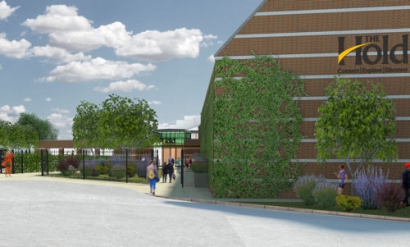
The new 300kW/360kWh E-STOR system includes a range of enhancements building on learning from the systems Connected Energy has installed over the last five years.
"'Leading the charge' on the use of second life batteries meant we had to start developing systems based on a relatively small data set," commented Connected Energy CEO, Matthew Lumsden. "But having run several systems though various duty cycles over the last few years we are now able to further optimize how the batteries are operated," he continued.
The new 300kW/360kWh containerized systems, which include 24 second life Renault Kangoo batteries, have benefitted from collaborative support from Renault and ABB to increase efficiencies on both the power and capacity sides of the system.
By bringing together a combination of Renault's battery performance modeling, system performance data and extensive CFD analysis, Connected Energy has been able to significantly reduce the cost of cooling the system while at the same time increasing the efficiency and control.
This has also resulted in new packaging which provides additional space to facilitate maintenance and house some of Connected Energy's niche functionality like EV charger integration.
"Second life systems can have different objectives," commented Lumsden, "the cost of the batteries is lower than for new lithium ion systems, so the degradation and overall cycle cost is lower. This means that duty cycles that are uneconomic for new systems can be viable for second life systems. The data-based design that has now been undertaken means we can more accurately optimize how the batteries are used within any duty cycle and better manage efficiencies and degradation."
Connected Energy's recently announced large 14.4 MWh system included in the SmartHubs project will enable it to accumulate more data from around 1000 batteries and enable further system optimization across its portfolio.
Suffolk County Council is a strategic partner in the Suffolk Sustainability Institute and will work with both the University of Suffolk and Connected Energy to help deliver common objectives in clean technology, energy efficiency, technology innovation and decarbonization.
As part of The Hold project Connected Energy will be working with the University of Suffolk on a knowledge exchange partnership which will support research and innovation activities across both organizations. The collaboration will allow access to the battery storage system for teaching and research purposes as well as projects to translate University science into practice.
University of Suffolk Sustainability Manager and Research and Business Lead for the Suffolk Sustainability Institute, Justine Oakes, stated, "This on-going partnership will provide compelling research and curriculum engagement opportunities; supporting pragmatic academic study in smart tech renewables and a deeper understanding of the role innovative technologies have to play in addressing the energy transition pathway to zero carbon through energy storage infrastructure. We are delighted to be collaborating with Connected Energy and Suffolk County Council in this living laboratory research space."
The Hold is expected to attract thousands of visitors each year, seeking to research local history, find out about their families, or to take part in events and activities. The £20 million project is funded by the National Lottery Heritage Fund, Suffolk County Council, and the University of Suffolk, with the generous support of a number of other organizations and charities. Due to the pandemic, The Hold will now have a phased opening later this year.

